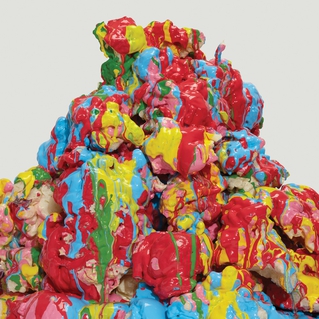Music
Battles takes it to the limit on Dross Glop

Dross Glop
Battles
Release Date: Apr 21, 12
- 1
- 2
- 3
- 4
- 5
- 6
- 7
- 8
- 9
- 10
The beauty of Battles’ singular brand of post-rockish weirdness is that there’s a buoyancy to most of their songs, a bounce that feels strange given their status as the oddball descendants of industrial rock (to an extent), but nevertheless right. A remix album, then, adds a further wrinkle to the equation, for there’s a prevailing sense of deliberation within Battles’ work. There’s a strength of discipline in their songs, a feeling that no matter how chaotic and unruly they go, there’s never a loss of absolute control at any point. Without it, some of their songs could easily break into cacophony, which is what happens far too much of Dross Glop.
The remix of last year’s brilliant Gloss Drop, Dross Glop is every bit as inverted (and aesthetically unpleasing) as the name suggests. The industrial undercurrent belying a lot of Battles songs is foregrounded regularly, but it’s significantly less effective without John Stanier’s propulsive drumming to keep the songs moving. The contrast is made stark when hearing The Alchemist’s take on “Futura,” which brings out the song’s lower tones while added his typical brand of jagged hip-hop production. That fares better than Shabazz Palaces’ highly uneven take on “White Electric,” which mostly loops guitar samples over verses that are typically esoteric for him, but unusually boring. “Unusually boring” is a good descriptor for over half of Dross Glop; for instance, The Field’s take on “Sweetie and Shag” drowns the song in atmospherics and turns it into an industrial-tinged dirge.
Far too much of the album takes the glitchy minimalism route as well. Most egregious is Silent Servant’s take on “Inchworm,” which reduces the whole song to electro noise and renders it unrecognizable. A lot of Dross Glop has this same problem; the purpose of the remix is to reinvent a song, but to turn it into one with no resemblance to the original whatsoever just makes Dross Glop a compilation of unremarkable electronic music. There are sparse highlights; Hudson Mohawke’s take on “Rolls Bayce” fuses the original with giddy 8-bit noise that gives the album its only genuinely grandiose moment. Gang Gang Dance’s take on “Ice Cream” isn’t really a remix so much as a GGD song that repurposes Matias Aguayo’s vocal samples, but it’s fun nevertheless. That fun is a virtue that for the most part Dross Glop is seriously lacking.